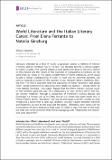Files in this item
World literature and the Italian literary canon : from Elena Ferrante to Natalia Ginzburg
Item metadata
| dc.contributor.author | Caserta, Silvia | |
| dc.date.accessioned | 2020-01-06T15:30:06Z | |
| dc.date.available | 2020-01-06T15:30:06Z | |
| dc.date.issued | 2019-12-19 | |
| dc.identifier.citation | Caserta , S 2019 , ' World literature and the Italian literary canon : from Elena Ferrante to Natalia Ginzburg ' , Modern Languages Open , vol. 2019 , no. 1 , 18 . https://doi.org/10.3828/mlo.v0i0.272 | en |
| dc.identifier.issn | 2052-5397 | |
| dc.identifier.other | PURE: 264191296 | |
| dc.identifier.other | PURE UUID: b52f379b-9ea0-4755-bb49-70366ebe93d6 | |
| dc.identifier.uri | https://hdl.handle.net/10023/19225 | |
| dc.description.abstract | Variously intended as a field of study, a paradigm, and/or a method of literary criticism, World Literature has in the last two decades become a central subject in literary studies. The current debate around World Literature is certainly central to the present and the future of the discipline of Comparative Literature. At the same time, as I show in this paper, a redefinition of World Literature, which would include a deeper understanding of both its risks and its potential benefits, can push us towards a revision of the canon(s) of our national literary traditions. Moving from Tim Park’s assertion that the popularity of Elena Ferrante’s “dull global novel” would contribute to obscuring more deserving authors – among whom he cites Natalia Ginzburg – this paper argues that Ferrante’s literary success could, on the contrary, pave the way for a rediscovery of past writers within the Italian literary tradition. Through a comparison of Ferrante’s L’Amica Geniale and Ginzburg’s La Strada che Va in Città, the article shows how both works are, in Pheng Cheah’s terms, “literature that worlds and makes a world”, insofar as they foreground a world that is open and unstable, crucially caught between tradition and modernity, as well as the local and the global. Ultimately, both works call for a conception of World Literature that does not need to imply the loss of the local, but that can rather promote what Florian Mussgnug calls “responsible and responsive local sensitivity”. | |
| dc.format.extent | 18 | |
| dc.language.iso | eng | |
| dc.relation.ispartof | Modern Languages Open | en |
| dc.rights | Copyright: © 2019 The Author(s). This is an open-access article distributed under the terms of the Creative Commons Attribution 4.0 International License (CC-BY 4.0), which permits unrestricted use, distribution, and reproduction in any medium, provided the original author and source are credited. See http://creativecommons.org/licenses/by/4.0/. | en |
| dc.subject | P Language and Literature | en |
| dc.subject | T-NDAS | en |
| dc.subject.lcc | P | en |
| dc.title | World literature and the Italian literary canon : from Elena Ferrante to Natalia Ginzburg | en |
| dc.type | Journal article | en |
| dc.description.version | https://doi.org/Publisher PDF | en |
| dc.contributor.institution | University of St Andrews. Italian | en |
| dc.identifier.doi | https://doi.org/10.3828/mlo.v0i0.272 | |
| dc.description.status | Peer reviewed | en |
This item appears in the following Collection(s)
Items in the St Andrews Research Repository are protected by copyright, with all rights reserved, unless otherwise indicated.

